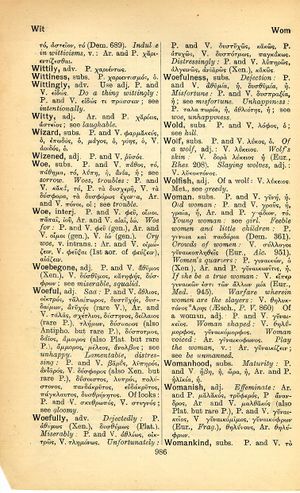woman: Difference between revisions
τἄλλαι ... γυναῖκες ... ἀπήλαἁν τὼς ἄνδρας ἀπὸ τῶν ὑσσάκων → the other women diverted the men from their vaginas
m (Text replacement - "Aesch., P. V." to "Aesch., ''P. V.''") |
mNo edit summary |
||
| Line 26: | Line 26: | ||
<b class="b2">Woman voiced</b>: Ar. [[γυναικόφωνος]]. | <b class="b2">Woman voiced</b>: Ar. [[γυναικόφωνος]]. | ||
<b class="b2">Play the woman</b>, v.: Ar. γυναικίζειν; see [[ | <b class="b2">Play the woman</b>, v.: Ar. γυναικίζειν; see be [[unman]]ned. | ||
}} | }} | ||
Revision as of 16:04, 28 August 2017
English > Greek (Woodhouse)
subs.
P. and V. γυνή, ἡ.
Old woman: P. and V. γραῦς, ἡ, γραῖα, ἡ, Ar. and P. γρᾴδιον, τό.
Young woman: see girl.
Feeble women and little children: P. γύναια καὶ παιδάρια (Dem. 361).
Crowds of women: V. σύλλογοι γυναικοπληθεῖς (Eur., Alc. 951).
Women's quarters: P. γυναικών, ὁ (Xen.), Ar. and P. γυναικωνῖτις, ἡ.
If she be a true woman: V. εἴπερ γυναικῶν ἐστι τῶν ἄλλων μία (Eur., Med. 945).
Warfare wherein women are the slayers: V. θηλυκτόνος Ἄρης (Aesch., P. V.
860).
Of a woman, adj.: P. and V. γυναικεῖος.
Woman shaped: V. θηλύμορφος, γυναικόμορφος.
Woman voiced: Ar. γυναικόφωνος.
Play the woman, v.: Ar. γυναικίζειν; see be unmanned.

